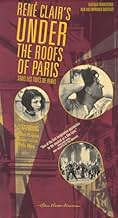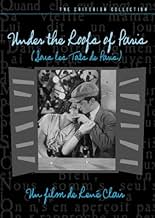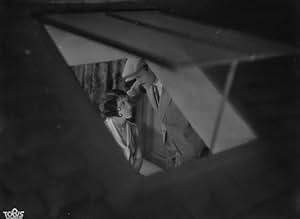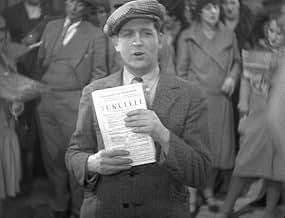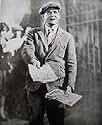Sous les toits de Paris
- 1930
- Tous publics
- 1h 36min
NOTE IMDb
7,0/10
2,6 k
MA NOTE
Albert est épris de Pola, mais se retrouve injustement emprisonné. Pendant ce temps, elle se console auprès d'un ami d'Albert, et à sa libération, l'amour et l'amitié sont mis à l'épreuve.Albert est épris de Pola, mais se retrouve injustement emprisonné. Pendant ce temps, elle se console auprès d'un ami d'Albert, et à sa libération, l'amour et l'amitié sont mis à l'épreuve.Albert est épris de Pola, mais se retrouve injustement emprisonné. Pendant ce temps, elle se console auprès d'un ami d'Albert, et à sa libération, l'amour et l'amitié sont mis à l'épreuve.
- Récompenses
- 1 victoire au total
Edmond T. Gréville
- Louis
- (as Edmond Gréville)
Delphine Abdala
- La buraliste
- (non crédité)
Raymond Aimos
- Un gars du milieu
- (non crédité)
Raymond Blot
- Un membre de la bande à Fred
- (non crédité)
Thomy Bourdelle
- François
- (non crédité)
Léon Courtois
- L'inspecteur
- (non crédité)
Édouard Francomme
- Un membre de la bande à Fred
- (non crédité)
André Michaud
- Un agent
- (non crédité)
Jane Pierson
- La dame du premier
- (non crédité)
Louis Pré Fils
- Le locataire du troisième
- (non crédité)
Eugène Stuber
- Un membre de la bande à Fred
- (non crédité)
Louis Zellas
- Le consommateur jaloux
- (non crédité)
Avis à la une
"Sous les toits de Paris", a 1930 comedy/drama was René Clairs first venture into sound film making - and is already a masterful showcase for the use of sound. It is actually a blend between silent movie and talking movie with whole sections being without any sound or the dialogue turned off. In its deliberate use of sound, the movie reminded me of Fritz Lang's "M".
Also, the sets are fantastic. They show the "lower" quarters of Paris as both a fantastic place and a realist place. It gives the movie a very nice touch.
But the story isn't that fantastic. It's a simplistic plot about a man falling in love. He's getting arrested. In the meantime, his best friend falls in love with his girl. I think Clair wasn't out to write something terribly new but used this simple, yet lovely story to carry his technical idea about sound (he was at that time still a strong defender of the silent cinema). Also, he wanted to show the "other" life in Paris, the low life. And he succeeds quite well at that.
All that said, however, I have to add that this isn't my kind of film. I appreciate its virtuoso style for its time, I even might consider it a classic to some extend because it led the way for a generation of film makers - but personally, it doesn't do much for me. I watch it sort of emotionless. Overall, I'd give it a very personal
6/10
Also, the sets are fantastic. They show the "lower" quarters of Paris as both a fantastic place and a realist place. It gives the movie a very nice touch.
But the story isn't that fantastic. It's a simplistic plot about a man falling in love. He's getting arrested. In the meantime, his best friend falls in love with his girl. I think Clair wasn't out to write something terribly new but used this simple, yet lovely story to carry his technical idea about sound (he was at that time still a strong defender of the silent cinema). Also, he wanted to show the "other" life in Paris, the low life. And he succeeds quite well at that.
All that said, however, I have to add that this isn't my kind of film. I appreciate its virtuoso style for its time, I even might consider it a classic to some extend because it led the way for a generation of film makers - but personally, it doesn't do much for me. I watch it sort of emotionless. Overall, I'd give it a very personal
6/10
The great French film actor Jacques Tati made several films that tried to capture a Paris that disappeared even before World WarII. It was a world best seen through the gifted photography of Atget and Brassai. A world of intimacy, silent streets, virtually no traffic, limited means, but unlimited pleasures. A wonderful opening shot glides across rooftops to join a cluster of ordinary Parisians enjoying a singalong, an odd but compelling precursor of karaoke and rock concerts, but untarnished by special effects or hype. There is a sense that we are witnessing a street version of Lautrec's Moulin Rouge.
The cinematography is extraordinary. It can only be compared to Fritz Lang's "M", or the "Third Man". Very little actually happens and dialogue is used sporadically. Yet we find ourselves caring very much about the people about whom we know so little.
An unforgettable film.
The cinematography is extraordinary. It can only be compared to Fritz Lang's "M", or the "Third Man". Very little actually happens and dialogue is used sporadically. Yet we find ourselves caring very much about the people about whom we know so little.
An unforgettable film.
René Clair's "Sous les toits de Paris" ("Under the Roofs of Paris" in English) manages to strike the right balance between happy and gritty. This jolly musical tells the story of a love affair between street singer Albert and Romanian immigrant Pola. Or at least, they attempt a romance. They're surrounded by all manner of lowlifes. This is not the gay Paree that we expect.
Released when talkies were still in their relative infancy, the movie has sound scenes, but also silent ones. It finds the right balance between them. Moreover, the characters are complex if lowly individuals. Watching it all these years later, I wonder which direction French cinema would've taken had World War II not happened.
Anyway, outstanding movie. Not the greatest by any stretch, but still impressive.
Released when talkies were still in their relative infancy, the movie has sound scenes, but also silent ones. It finds the right balance between them. Moreover, the characters are complex if lowly individuals. Watching it all these years later, I wonder which direction French cinema would've taken had World War II not happened.
Anyway, outstanding movie. Not the greatest by any stretch, but still impressive.
Having been highly impressed by "Le Million", I decided to check out Rene Clair's other acclaimed musical comedy, "Under the Roofs of Paris". I can happily assure you that this film was even better than "Le Million" in almost every single way. It amps up the heart and humor, has a much stronger emotional impact, and, while "Le Million" felt like a purely plot driven film, "Under the Roofs of Paris" balances plot and character to near perfection.
This hilarious love story unfolds slowly and steadily, introducing the audience to different characters and places without rushing everything. We watch and learn before the plot strikes us like a lightning bolt of beauty. Rene Clair's camera beautifully glides through the streets of Paris, following characters and peaking in on their most fragile moments. This film is like the finest work of literature; it contains laughs and tears, moments of melancholy and hope. It is, simply, a masterpiece.
This hilarious love story unfolds slowly and steadily, introducing the audience to different characters and places without rushing everything. We watch and learn before the plot strikes us like a lightning bolt of beauty. Rene Clair's camera beautifully glides through the streets of Paris, following characters and peaking in on their most fragile moments. This film is like the finest work of literature; it contains laughs and tears, moments of melancholy and hope. It is, simply, a masterpiece.
10zetes
René Clair's early sound films are amongst the best ever made. Le Million (1931), Quatorze Juillet (1933), and Under the Roofs of Paris (1930) are masterpieces of musical comedy and romance (I leave out perhaps his most famous, À nous la liberté, which I need to see again). Under the Roofs of Paris is the loose but good story of a young street singer (Albert Préjean) who falls in love with a girl (Pola Illéry). He has an uneasy relationship with a couple of pickpockets (including Gaston Modot, who also made L'Âge d'or with Buñuel the same year) who like to work when he's demonstrating his talent. In the film's opening scene, there is an amazingly edited sequence of one of these men at work. Everyone wants Pola, including Albert's best friend, Louis, and when Albert is framed for burglary, they don't think twice about going after her. Clair's direction moves like silk. It's so supple. The camera movements, full of crane shots and pans, is technically stunning, especially for the time but even now. And the use of sound is absolutely revolutionary. It's more or less half silent, half talkie. Unlike many early sound films, Clair keeps the dialogue to a minimum, so it's never clunky. Characters only speak when they have to; at other times, they gesture. The film is often described as a musical, but it is not. There are two songs, and the music arises diagetically from an accordion player. The music, and the use of music, are quite amazing. This is one of the most wonderful movies ever made.
Le saviez-vous
- AnecdotesThe opening sequence and the street scenes were filmed in a studio.
- Citations
Albert, a young street singer: [On seeing Pola bedding down on his bedroom floor] Okay, take the bed, I'll sleep on the floor.
- ConnexionsFeatured in Les dossiers de l'écran: Boulevard du crépuscule (1969)
Meilleurs choix
Connectez-vous pour évaluer et suivre la liste de favoris afin de recevoir des recommandations personnalisées
- How long is Under the Roofs of Paris?Alimenté par Alexa
Détails
- Durée
- 1h 36min(96 min)
- Couleur
Contribuer à cette page
Suggérer une modification ou ajouter du contenu manquant



